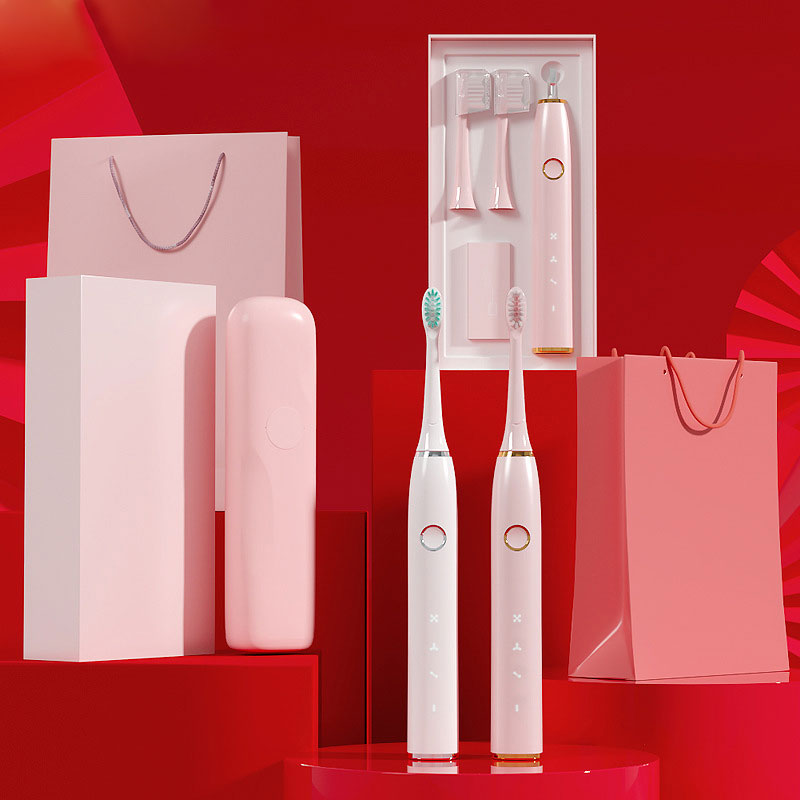Benefits and Considerations for Using a Sonic Electric Toothbrush
2024-07-18
A sonic electric toothbrush is an advanced oral care device that uses high-frequency vibrations to clean teeth and gums more effectively than manual brushing. Here are the key features, benefits, and considerations for using a sonic electric toothbrush:
Key Features:
1. High-Frequency Vibrations:
- Vibration Speed: Typically ranges from 30,000 to 62,000 brush strokes per minute.
- Cleaning Action: The rapid vibrations create dynamic fluid action, driving toothpaste and water between teeth and along the gum line.
2. Brush Heads:
- Interchangeable Heads: Various brush head designs for different cleaning needs (e.g., plaque control, gum care, whitening).
- Soft Bristles: Gentle on gums while effectively cleaning teeth.
3. Modes and Settings:
- Multiple Modes: Options like clean, whiten, gum care, sensitive, and massage.
- Intensity Levels: Adjustable intensity settings to customize the brushing experience.
4. Timers and Alerts:
- Built-In Timer: Ensures brushing for the dentist-recommended two minutes.
- Quadpacer: Signals to move to a different quadrant of the mouth every 30 seconds.
5. Battery Life:
- Rechargeable Battery: Long-lasting battery life, often up to two weeks on a single charge.
- Charging Options: Charging stations or USB charging for convenience.
6. Smart Features:
- Bluetooth Connectivity: Syncs with mobile apps to track brushing habits and provide feedback.
- Pressure Sensors: Alerts if you are brushing too hard to protect gums and enamel.
7. Ergonomic Design:
- Comfortable Grip: Designed for easy handling and control.
- Slim and Lightweight: Convenient for daily use and travel.
Benefits:
1. Superior Cleaning:
- Effective Plaque Removal: Removes more plaque compared to manual brushing.
- Improved Gum Health: Gentle yet effective cleaning action promotes healthy gums.
2. Whitening:
- Stain Removal: Helps to remove surface stains and whiten teeth over time.
3. Ease of Use:
- Consistent Technique: Provides a consistent brushing technique, ensuring thorough cleaning.
- User-Friendly: Suitable for people with limited dexterity or arthritis.
4. Oral Health Monitoring:
- App Integration: Tracks brushing habits and provides personalized recommendations.
5. Convenience:
- Travel-Friendly: Long battery life and travel cases make it easy to use on the go.
Considerations:
1. Cost:
- Initial Investment: Higher upfront cost compared to manual toothbrushes.
- Replacement Heads: Ongoing cost for replacing brush heads every three months.
2. Maintenance:
- Cleaning: Regular cleaning of the brush head and handle to prevent build-up.
- Storage: Proper storage to keep the toothbrush dry and hygienic.
3. Adaptation Period:
- Learning Curve: May take time to get used to the vibrations and different brushing technique.
4. Noise:
- Sound Level: Some models may be louder than manual toothbrushes.
Tips for Using a Sonic Electric Toothbrush:
1. Start Slowly: Begin with the lowest intensity setting if you are new to sonic toothbrushes.
2. Brush Gently: Let the toothbrush do the work; avoid applying excessive pressure.
3. Use the Timer: Follow the built-in timer and quadpacer for a thorough clean.
4. Replace Heads Regularly: Change the brush head every three months or sooner if the bristles are frayed.
5. Follow App Guidance: If your toothbrush has a connected app, use it for tips and to monitor your brushing habits.
A sonic electric toothbrush can significantly enhance your oral hygiene routine, leading to healthier teeth and gums with consistent use.



